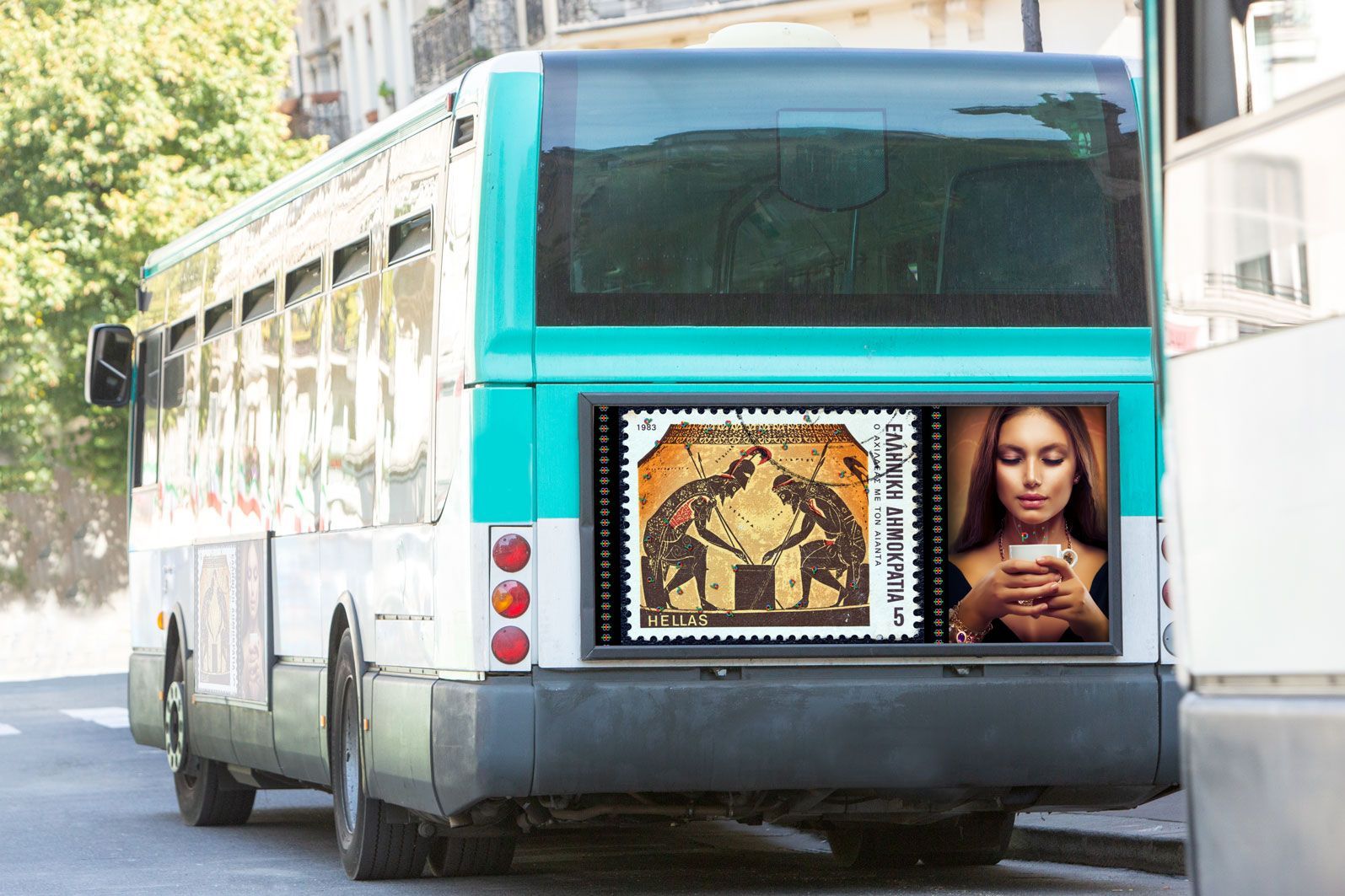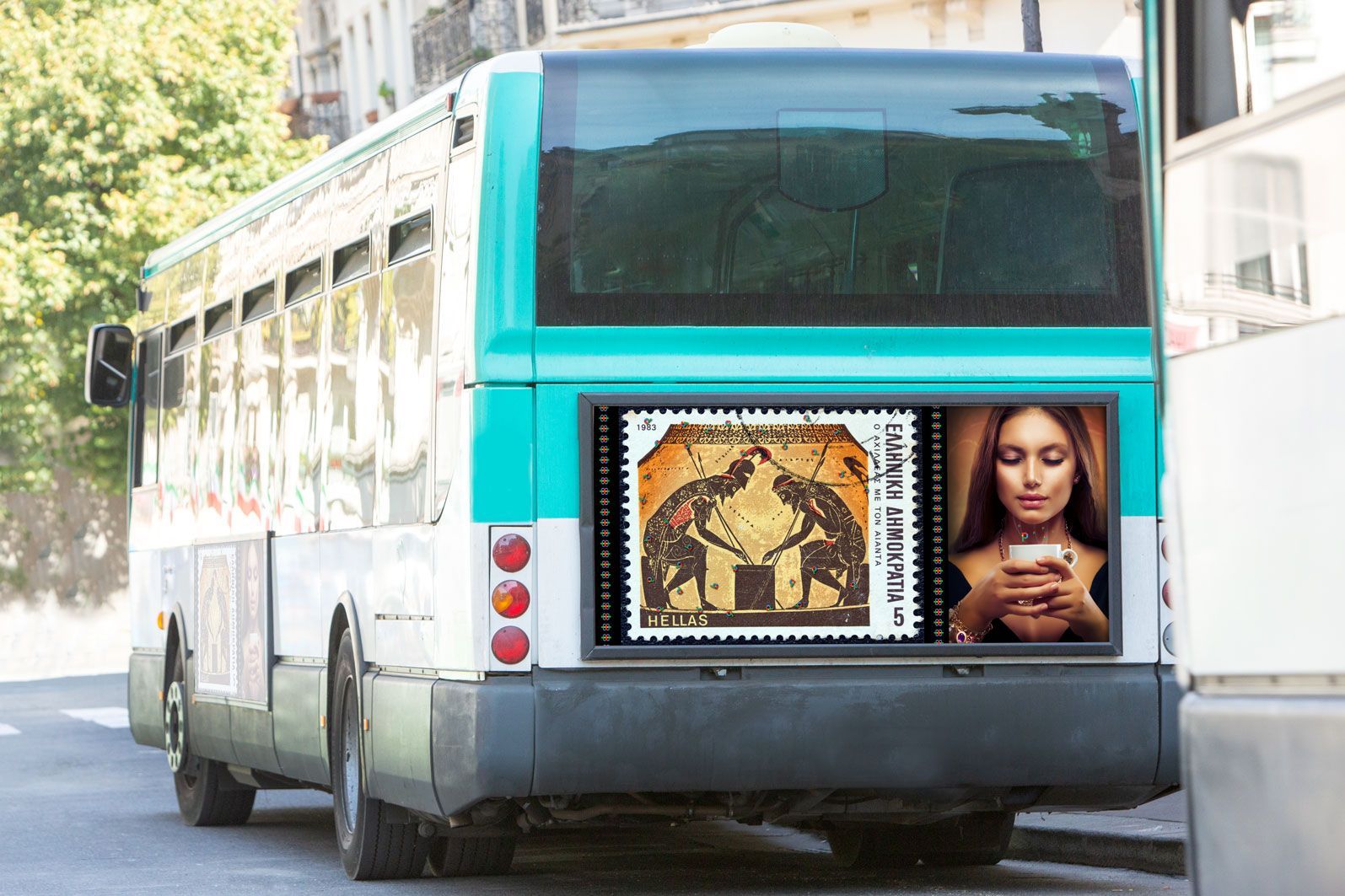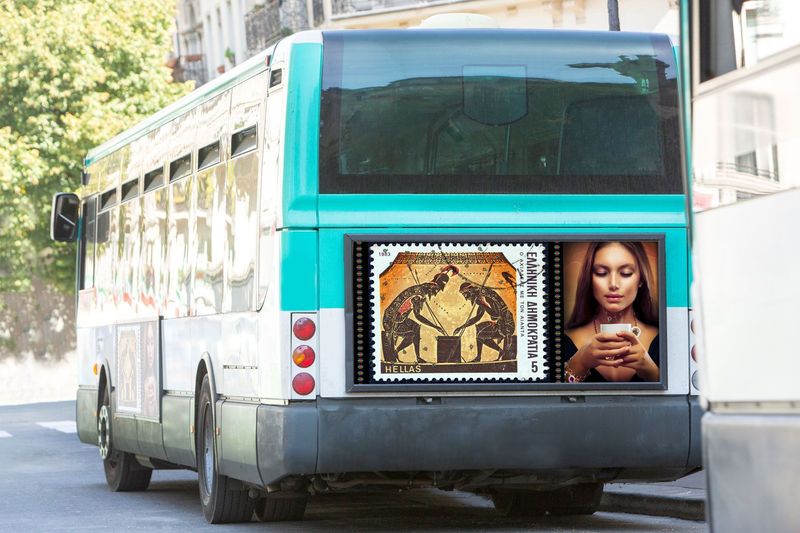A Nihilist's Pension

Homer at the Back of the Bus in the Hellenistic Age
Sophia often found herself sitting on the benches at the park, watching the ripples on the pond as if they carried the weight of her thoughts. She was getting on in years, her once raven hair now a soft shade of moonlight. Her laughter lines deepened, mapping out a life well-lived yet quietly yearning. It was during these quiet reflections she whispered to herself,
Old Age
Of course I am downcast and tremble
with pity for my state
when old age and wrinkles cover me,
when Eros flies about
and I pursue the glorious young.
Pick up your lyre
and sing to us of her who wears
violets on her breasts. Sing especially
of her who is wandering.
— Sappho (630-570 BC) - Translated by Willis Barnstone
The words of Sappho, translated by Willis Barnstone, spoke to her in a chorus of memories, echoing the sentiments of her youth, when her heart raced at the sight of Alexander—the eternal charmer with a crooked smile that could set a thousand hearts aflame.
Alexander, who had once been the embodiment of Eros himself, was now a playful companion to Sophia in their golden years. They'd often jest about the days when they chased the glorious young together, not as rivals but as conspirators in a game where everyone was both the hunter and the hunted.
As the sun began to dip below the horizon, Sophia would turn to Alexander, her old friend who never seemed to lose his spark, and implore, "Pick up your lyre and sing to us of her who wears violets on her breasts. Sing especially of her who is wandering."
And Alexander, with a voice not as steady as it once was but with a spirit just as bright, would strum imaginary strings and serenade the ducks waddling by, who seemed utterly unimpressed by his impromptu concert.
Their laughter would ring out, blending with the cool evening air as if to defy the passage of time. Together, they shared stories of their youth, the adventures that now seemed as distant and mythical as the epics of Homer. They spoke of lovers and friends, of journeys taken and those left behind.
"If you're going through hell, keep going," Alexander would chuckle after recounting a particularly harrowing escapade from their past, mischievously attributing the phrase to Winston Churchill. It was their shared mantra, a reminder that no matter the challenges, they would march on, side by side, with grins as wide as the Cheshire Cat's.
Through the lens of their unyielding humor, even the most arduous memories became fodder for their amusement. They crafted their narrative not as a somber walk through the inferno but as a whimsical stroll, with each misstep a cause for mirth rather than misery.
As night fell, they would sit under the canopy of stars, a blanket shared between them, musing about the world and its curious turns. "The age of the book is almost gone," Sophia mused, a playful glint in her eye as she quoted George Steiner.
Alexander would feign a dramatic gasp, clutching his chest as if the very thought wounded him. "Gone? Never!" he would exclaim. "For as long as we can spin tales and make the constellations jealous of our tales, the age of the book shall live on in us!"
Their banter was endless, a dance of wit and nostalgia that knew no final bow. In their shared twilight, Sophia and Alexander found a joy that was both a tribute to the past and a toast to the moment. And as they made their way home, arm in arm, their laughter was a testament to the timelessness of their bond, an ode to the ageless spirit that no wrinkle could mar, no shadow could dim.
Sophia and Alexander’s excursions were not limited to the tranquility of the park. They ventured into the world with a gusto that belied their years, often finding themselves in circumstances that would have daunted souls far younger.
On one such occasion, they found themselves at the city bus terminal, an expedition that began as a lark. “Let’s ride the bus and see where it takes us,” Sophia had proposed, her eyes twinkling with the prospect of random adventure. Alexander, never one to shy away from a chance to add color to their day, agreed with a vigorous nod.
The bus they boarded was no ordinary vehicle; it was an animated beast adorned with vivid images from the Hellenistic Age, a stark contrast to the advertisements of today’s youth. They sat at the back, just in front of an ad depicting ancient heroes, their youthful vigor frozen in time.
Alexander leaned in, his voice a conspiratorial whisper. "Do you think they had buses like this back in their day, Sophia? Racing chariots, perhaps, with ads for the latest toga fashions?”
Sophia's laughter was a melody that warmed the hearts of those around them. She responded with a playful nudge, “I doubt they had your singing heroes on them, my dear Alexander. Or your off-key serenades.”
As the bus trundled along, they encountered a delay—a parade was crossing, a vibrant procession that brought the city to a standstill. The bus driver, clearly frustrated, muttered under his breath, the tension palpable.
It was Sophia who rose to the occasion, her voice clear and strong, reciting the immortal words of Winston Churchill:
If you're going through hell, keep going.
— Winston Churchill (1874-1965)
The passengers, caught off guard by her sudden proclamation, couldn't help but smile, the atmosphere lightened. Alexander, inspired by Sophia’s audacity, stood and began to narrate the parade as if it were an epic, his words painting pictures more vivid than the scenes outside the windows.
“See there, the float of the bakers, their bread sculpted into shapes of legendary beasts!” he announced, pointing out the window. “And follow it comes the guild of florists, with petals that could outshine the gardens of Babylon!”
The bus, its journey disrupted, became a vessel of mirth, with Sophia and Alexander at the helm. Even the driver couldn’t resist a chuckle, his earlier irritation forgotten. For the duration of the delay, their corner of the bus was transformed into a rolling theatre, a haven of hilarity and warmth.
Time slipped by unnoticed as the parade passed, and once the way was clear, their journey resumed. As the bus weaved through the city, Sophia reflected on the words of George Steiner: "The age of the book is almost gone."
The age of the book is almost gone.
— George Steiner's (1929-2020)
Alexander pretended to be scandalized. “What heresy you speak! The age of the book will never wane so long as there are stories to be told, adventures to be had!”
“And what of the digital age, with its screens and gadgets?” Sophia teased, a smile playing on her lips.
With a flourish, Alexander pulled out a smartphone, waving it with dramatic flair. “Behold, the modern tome! Compact, portable, a library in your pocket!”
The two erupted into laughter, the other passengers watching this exchange with delight. In the eyes of Sophia and Alexander, the essence of the book was not bound to the paper it was printed on but lived in the tales shared and the connections made, a spirit as infectious as their laughter, as enduring as their friendship.
Their bus adventure had been one for the ages, a tale that Sophia and Alexander would recount with glee in the days to come. But their escapades were not yet over. As they disembarked, they found themselves in front of a quaint little shop that seemed to have sprung from another era, its windows cluttered with curios and trinkets from times long past.
Sophia's gaze lingered on a small, intricately carved music box, its surface worn by the touch of countless fingers. She mused aloud, reflecting the sentiment of George Steiner, "The age of the book is almost gone."
The age of the book is almost gone.
— George Steiner's (1929-2020)
"Ah, but not the age of curiosity," Alexander replied with a twinkle in his eye, ushering her inside the shop with the excitement of a child entering a candy store. "Here, the stories are not just read; they are touched, heard, and seen. They resonate in the very air we breathe!"
Inside, the shopkeeper, a woman of indeterminate age, watched them with amusement as they perused her collection. They paused before a section of vintage postcards, each depicting scenes from eras neither Sophia nor Alexander had lived but felt intimately familiar with, as if they were scenes from their own collective memory.
"Look, Alexander," Sophia exclaimed, pointing to a postcard featuring the Acropolis. "We may not have seen Athens in its prime, but here it is, captured in miniature, a story in sepia."
Alexander picked up the postcard, holding it at arm's length. "And here we stand, two would-be Socrates, philosophizing in the Agora of modernity," he declared with a dramatic flourish that earned a hearty laugh from the shopkeeper.
Their laughter was a counterpoint to the serene quiet of the shop, a place out of time that welcomed the joy they brought with them. They meandered through the aisles, their shadows stretching long in the golden light that filtered through the dusty windows.
As the day drew to a close and the shop's quaint bell signaled their departure, Sophia and Alexander stepped out into the cooling evening, each with a small token—a book for Sophia, a miniature lyre for Alexander—to remember the day by.
Walking arm in arm, they continued their dialogue, their conversation a seamless blend of wit and reminiscence. "What a grand adventure today has been," Sophia sighed contentedly. "From the back of a bus to the depths of history, we've traveled without moving an inch."
"And all the while," Alexander added with a mock-serious tone, "we've dodged the hellish despair of boredom and routine. Our dear Churchill would be proud."
Sophia nodded, her eyes bright. "Indeed, he would. For we've kept going, through every twist and turn, through every chapter of our lives."
As the sky deepened to a rich velvety blue, they found themselves outside a small cafe. With a shared glance, they decided to end their day as they had begun it—with spontaneity.
Inside, surrounded by the warm hum of conversation and the rich aroma of coffee, they raised their cups in a silent toast to the day, to their enduring friendship, and to the many stories yet to come.
For Sophia and Alexander, the age of the book was far from over. It was alive in every moment they shared, every laugh that escaped their lips, every memory they cherished. In their hearts and in their tales, the spirit of the book would never die—it would simply evolve, taking on new forms, just as they had over the years.
Their laughter lingered in the air long after they had left the cafe, a testament to the day's journey—a journey that proved the power of friendship, the joy of living, and the eternal nature of stories.

The planksip Writers' Cooperative is proud to sponsor an exciting article rewriting competition where you can win part of over $750,000 in available prize money.
Figures of Speech Collection Personified
Our editorial instructions for your contest submission are simple: incorporate the quotes and imagery from the above article into your submission.
What emerges is entirely up to you!
Winners receive $500 per winning entry multiplied by the article's featured quotes. Our largest prize is $8,000 for rewriting the following article;

At planksip, we believe in changing the way people engage—at least, that's the Idea (ἰδέα). By becoming a member of our thought-provoking community, you'll have the chance to win incredible prizes and access our extensive network of media outlets, which will amplify your voice as a thought leader. Your membership truly matters!


